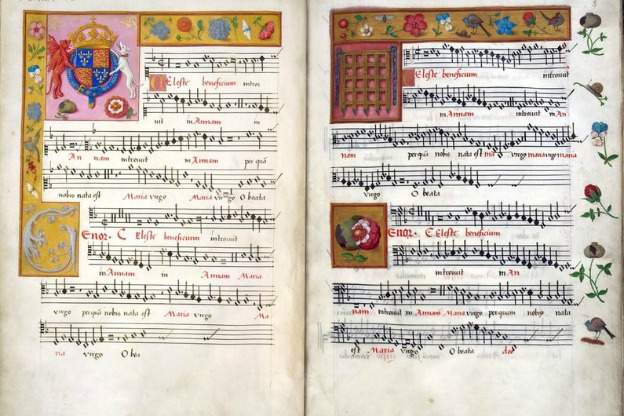
The vocal ensemble Alamire and the English Cornett and Sackbut Ensemble have released a recording called The Spy’s Choirbook. It takes its name from a number of surviving letters suggesting that Petrus Alamire, in addition to his musical endeavors, may have acted as a political spy for Henry the VIII.
16th-Century Manuscript
The 2014 Obsidian two-disc release features the entire contents of a manuscript assembled by the music scribe (and the ensemble’s namesake!) Petrus Alamire.
Held in the British Library, the manuscript is a lusciously illuminated 16th-century choirbook that Petrus Alamire gave as a gift to Henry VIII and Catherine of Aragon around the year 1516.
In it are some 28 motets along with six chanson on texts from Virgil’s Aeneid. None of the pieces in the collection are attributed, but since many of them also appear in other manuscripts or editions, we can recognize many of them as works by some of the most famous composers of the day like Josquin des Prez, Jean Mouton, Heinrich Isaac, Antoine de Fevin, Pierre de la Rue, and others. Still some pieces remain anonymous and unique to the manuscript at hand.
One of the anonymous works, Dulcissima virgo Maria, is a prayer to the Virgin Mary—a death bed supplication that translates “Holy mother of God, remember me and pray for me to Christ when the hour of death comes.” The harmonies become bolder and bolder as the short piece builds all the way to the end of that text to a final cadence that the Alamire Ensemble’s director David Skinner describes in his liner note as an effectively unprepared cluster-cord.
Probably some of Petrus Alamire’s latest additions to the manuscript are the several consecutive Dulces exuviae motet settings from Virgil's Aeneid. Again, the text is sung by one facing the end—Dido's last lamenting words as set to music by Josquin.
Instruments
This entire program is vocal music, but many of the motets are easily adaptable for performance by instruments.
On several tracks, The English Cornett and Sackbut Ensemble perform with the Alamire choir by doubling parts, while other tracks are presented as purely instrumental versions with cornett, sackbutt, slide trumpet, and shawm—all at the relatively high pitch of A=466.









